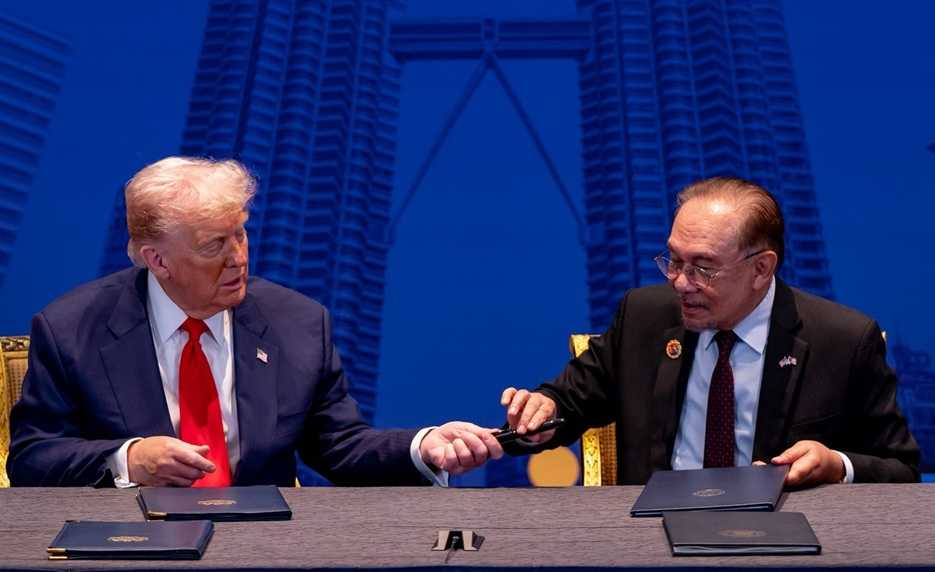Beyond dance with Trump, shocking details emerge on deal Anwar signed
1 day ago
While Anwar Ibrahim has been widely condemned for "undignified" and "servile" behaviour after dancing alongside Donald Trump shortly after the US president emerged from his aircraft yesterday, questions are now being raised over the contents of a trade agreement the prime minister signed hours later, which includes clauses requiring Malaysia to consult Washington before engaging in trade with a third country.
Excerpts from the agreement, signed by Trump alongside a visibly excited Anwar who were seen repeatedly trying to to humour the US leader, have begun circulating on social media, prompting strong public reactions, with many asking whether the prime minister has finally surrendered Malaysia's sovereignty – a familiar warning previously voiced by former leader Dr Mahathir Mohamad.
Trump's visit saw Malaysia and the US sign a new reciprocal trade agreement, granting US exporters a range of preferential access to the Malaysian market, in return for Washington retaining the 19% tariff recently imposed by Trump.
In a statement, Perikatan Nasional condemned the agreement as "a surrender".
"Malaysia gives away too much control over its economy, while the US keeps its freedom to decide what benefits its own industries. This deal limits Malaysia's right to make our own decisions, forcing us to follow US rules in trade, investment, and regulation," the coalition said in a statement released by PN secretary-general Azmin Ali.
"What is described as a 'reciprocal partnership' is, in truth, the loss of our economic sovereignty and policy space."
Veteran DAP leader Teng Chang Khim urged Putrajaya to come clean on the claims.
"If they were true, the government needs to explain why these clauses do not jeopardise the sovereignty of Malaysia," he said, sharing screenshots of several clauses from the agreement.
These include a clause requiring Malaysia to consult the US before entering any new digital trade agreement with another country "that jeopardises essential US interests".
Another clause states that the US government would reimpose the 25% tariff announced in April should Malaysia enter into any bilateral trade deal with "a country that jeopardises US interests".
The phrase likely refers to China, Washington's main obstacle to trade hegemony, as well as several nations facing US sanctions, including Iran and Russia – all members of BRICS, the powerful economic bloc led by Brazil, Russia, India, and China, which Malaysia has applied to join.
According to a joint statement released by the White House, Malaysia also agreed not to ban or impose quotas on exports of rare earth minerals to the US, a move seen as undermining China.
As the world's largest rare earth producer, Beijing has recently used its significant leverage over the US, which relies on China for much of its rare earth supply.
The Trump administration has been forced to negotiate with China after the latter imposed export controls on rare earth minerals to the US, affecting American defence and high-tech industries.
Further in the agreement, Malaysia is also required to align with any US move to punish other countries with customs duties, quotas, prohibitions, fees, charges, or other import restrictions.
It states that once notified of such a move, "Malaysia shall adopt or maintain a measure with equivalent restrictive effect as the measure adopted by the United States or agree to a timeline for implementation".
PN said the clause forces Malaysia to "take sides in other people's conflicts and destroys the neutrality that has long been our strength."
"If Washington decides to block imports from China or Russia, Malaysia must dothe same, even if it harms our economy.
"By aligning Malaysia's policies with US decisions, the agreement risks driving away investors who value Malaysia's role as a neutral and stable partner in this part of the world," it added.
Prominent government critic Eric See-To said the clause essentially binds Malaysia to serve US national security interests.
"The direct effect is that Malaysia loses the right to determine its own trade and diplomatic policies towards other nations. If the US imposes sanctions on any country, Malaysia is automatically expected to follow suit, even if that country is an important trading partner of Malaysia," he said.
He warned that the agreement ties Malaysia's trade and security policies to the US geopolitical agenda.
"If Washington imposes sanctions, Malaysia is no longer free to remain neutral. Instead, it is forced to follow America's lead."
...Read the fullstory
It's better on the More. News app
✅ It’s fast
✅ It’s easy to use
✅ It’s free









